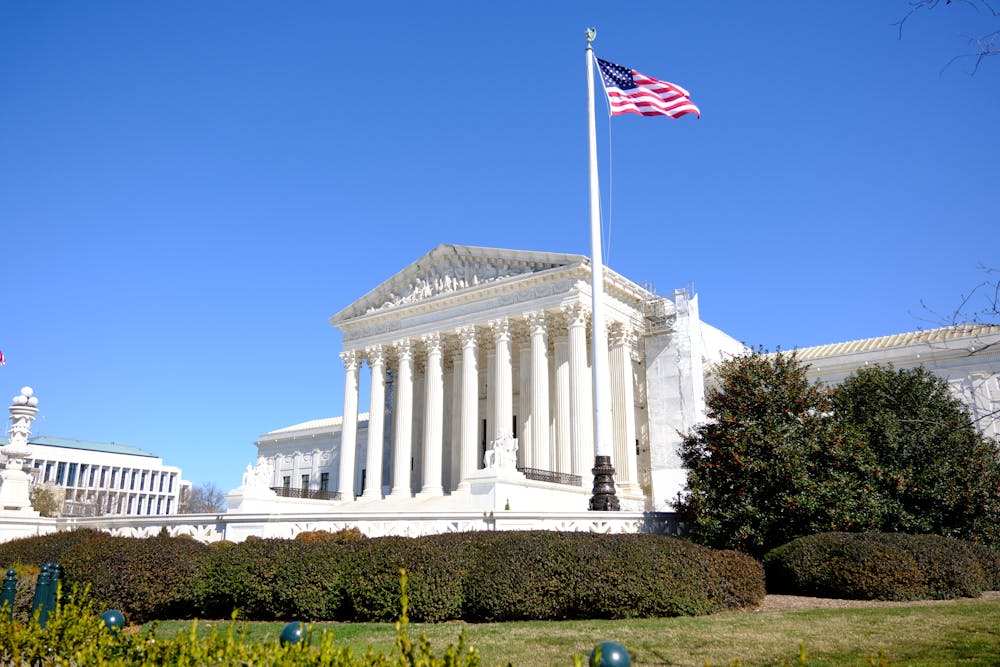
A U.S. House of Representatives report detailing findings from a multi-committee investigation into antisemitism was released on Dec. 18, 2024.
The 42-page report is the culmination of an investigation Speaker of the United States House of Representatives Rep. Mike Johnson (R-La.) initiated last April, when he called for a "House-wide crackdown on antisemitism." The report offered a roadmap for legislation the Republican Party plans to pursue during this Congressional session, which began on Jan. 3 and included recommendations for stronger oversight into American universities — including Penn — from the U.S. Department of Education and other federal agencies.
The report was a joint effort by six Republican-led House committees — including Education and the Workforce, Energy and Commerce, the Judiciary, Oversight and Accountability, Veterans’ Affairs, and Ways and Means. The new report echoes numerous findings from the Education Committee’s 325-page report released in October 2024, which revealed Penn's disciplinary data and private exchanges between senior administrators.
In a Dec. 19, 2024 statement announcing the new report, Johnson wrote that Congress would "take this report, its recommendations, and act.”
"On October 8th, the world saw that antisemitic hatred was alive and well at American institutions of so-called ‘higher’ education. As a result, the reputation of many of these schools has been in free fall,” former House Committee on Education and the Workforce Chair Virginia Foxx (R.-N.C.) wrote in the same statement. “Stopping that free fall comes down to one word: accountability. We need accountability because without it, we cannot guarantee that Jewish students have the safe learning environment they deserve."
The report stated that the Committee on Education and the Workforce's investigations had been "unprecedented in its depth and scope," and that findings were substantiated through subpoenas that Congress served universities “for the first time in its 157-year history” due to administrators' "failure to satisfy the Committee’s demands."
The report alleged that university leaders "expressed hostility to congressional oversight" and cited Penn administrators’ attempts to “orchestrate media coverage depicting Members of Congress as bullying and grandstanding.”
A University spokesperson declined a request for comment.
In a section of the report focused on the disciplinary processes of 11 universities, the Committee alleged that institutions "utterly failed to enforce their rules and impose discipline in response to antisemitic conduct violations." Numerous incidents that took place on Penn's campus in spring 2024, including the attempted occupation of Fisher Bennett Hall and the Gaza Solidarity Encampment, were mentioned in the report.
“Despite multiple serious antisemitic incidents … Penn imposed little discipline. Only three students at Penn were suspended for a single semester and 14 students received semester-long disciplinary probations,” the report stated.
In response to the findings, the report detailed several recommendations for higher education institutions to mitigate antisemitism on campuses — including recommendations for increased enforcement of Title VI of the Civil Rights Act of 1964 — which universities are required to comply with.
The report also called for universities to report discrimination and instances of antisemitism more forcefully under the Jeanne Clery Disclosure of Campus Security Policy and Campus Crime Statistic Act, which requires “additional reporting when victims of certain crimes are elected on the basis of certain characteristics — including religion, national origin, and ethnicity.”
The Committee of the Judiciary outlined several requests to the Department of Homeland Security regarding the number of student visas that have been revoked by the State Department due to the students’ participation in antisemitic incidents or “actions related to anti-Israel protests.” However, the report held that the DHS “has refused to provide a substantive response to the Committee’s questions.”
The Committee of Energy and Commerce conducted a probe into whether universities receiving funding from the Department of Health and Human Services and National Institutes of Health were held accountable by these agencies for preventing antisemitic incidents and adhering to civil rights laws. The investigation found that the HHS and NIH "failed to act in the wake of emerging antisemitism across college campuses" or ensure the universities’ compliance with federal civil rights laws. Penn was not included in the Committee of Energy and Commerce's investigation.
“These six grantee institutions received more than $2.7 billion in taxpayer funding through the NIH in FY 2023 alone. The Committees questioned what, if any, efforts the NIH is making to hold grantee institutions accountable for rising antisemitism on their campuses and what, if any, efforts HHS OCR is making to ensure grantee institutions’ comply with Title VI,” the report stated.
Penn received over $782 million in funding from the HHS in the 2023 fiscal year, and was awarded over $550 million by the NIH in the 2022 fiscal year.
The Daily Pennsylvanian is an independent, student-run newspaper. Please consider making a donation to support the coverage that shapes the University. Your generosity ensures a future of strong journalism at Penn.
Donate












